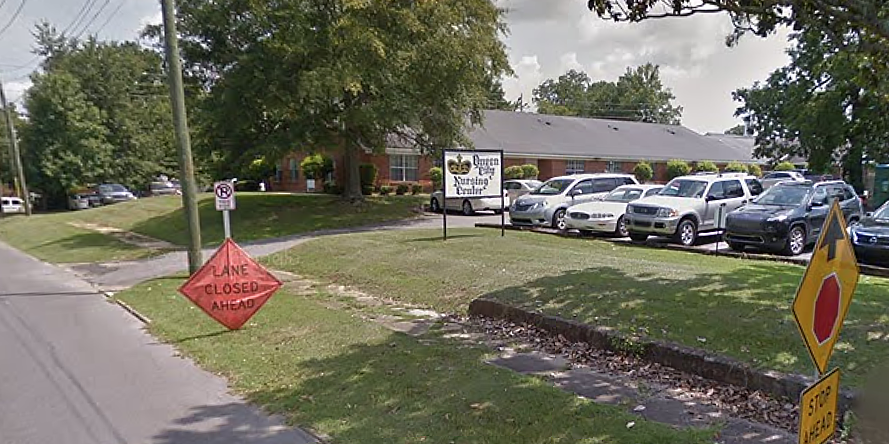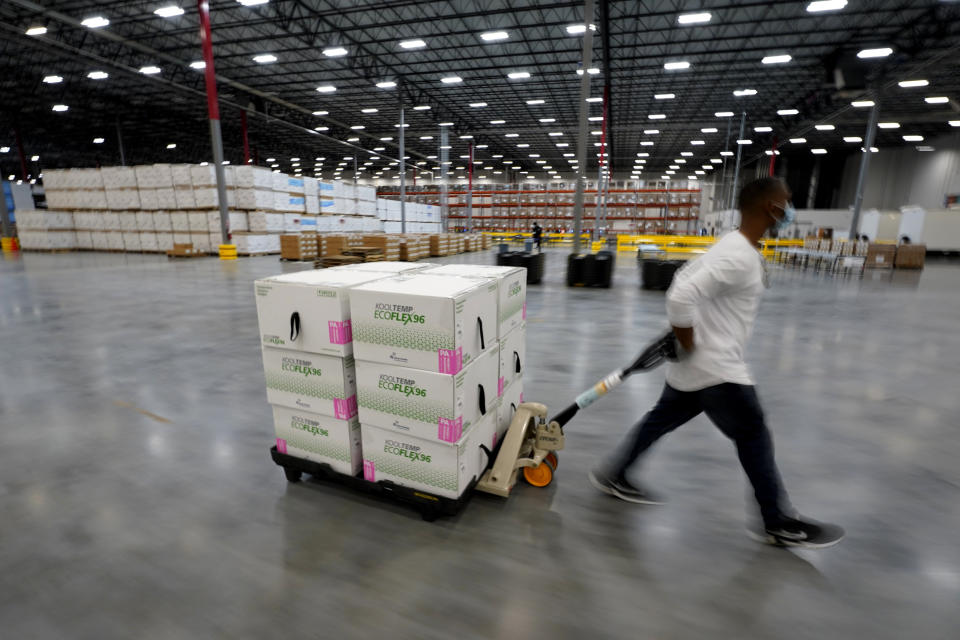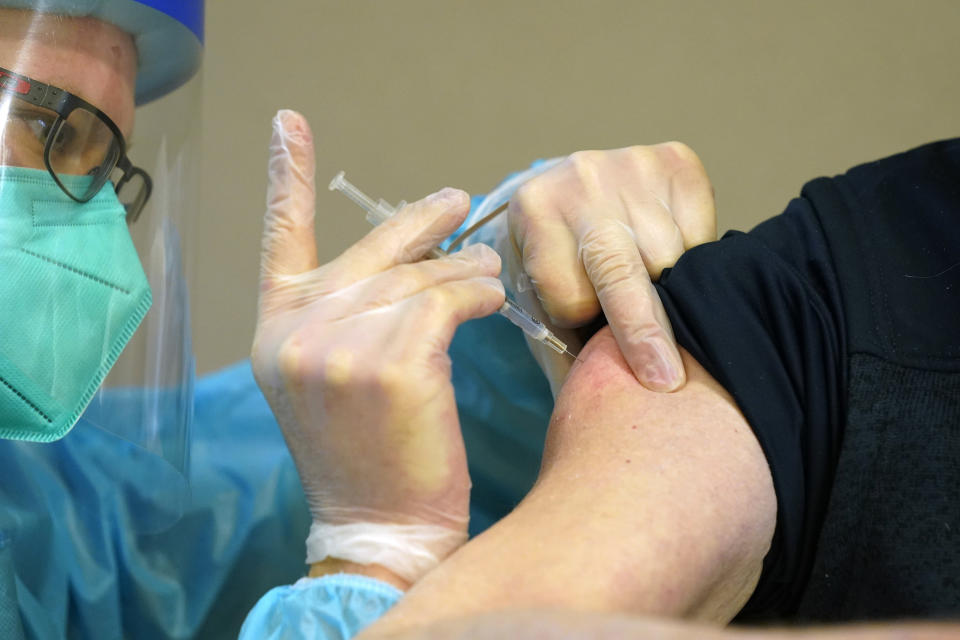'A long wait': Mississippi faces delays in vaccinating nursing home residents
JACKSON, Miss. — JoAnn Hawkins spent the waning days of 2020 talking about the coronavirus vaccine.
Hawkins, the director of nursing at the Queen City Nursing Center in Meridian, Mississippi, saw the virus as a looming threat — and the vaccine as the only sure way to protect the nursing home’s 56 elderly residents.
So she was relieved when families began sending in consent forms for their loved ones to receive the vaccine. The residents then started pressing staff members, “When can I get it?” she said.
That question has grown increasingly urgent in the past month, as more than half of the facility’s residents have contracted Covid-19, and four have been hospitalized.

Yet the vaccine was nowhere in sight. Walgreens, which along with CVS signed deals with many states to distribute the vaccine to nursing homes, told administrators on Jan. 6 that Queen City Nursing Center wouldn’t get the first round of doses until Feb. 11.
“Feb. 11 is a long wait for those vaccines to be delivered,” Hawkins said.
Under pressure from state officials this week, Walgreens moved Queen City’s vaccination date up to Jan. 21. But statewide, the effort is still going slowly.
While frustrations with the sluggish pace of the vaccine rollout are present across the country, the problem has been particularly acute in Mississippi. For the first two weeks of January, Mississippi consistently ranked in the bottom several states for vaccinations per capita, according to NBC News’ count.
As of Tuesday, less than 5 percent of the 89,700 doses allocated to Walgreens and CVS to vaccinate residents and staff members at Mississippi’s long-term care facilities had been administered. Federal health officials have urged states to prioritize reaching residents in such settings first, because they are the most vulnerable to the virus. But state leaders said this week that the incremental pace of the rollout means that some nursing homes would not receive their first shot until February — weeks later than expected.
Now, state officials are considering removing facilities from the federal partnership with Walgreens and CVS and finding a faster way of getting shots to the residents who need them most.
One Walgreens official pointed to a shortage of pharmacy workers and nurses in Mississippi as hampering the effort.
“In other states, like Texas, where we don’t have any staffing challenges, we can move a lot quicker,” Roy Armstrong, a regional health care director for the pharmacy chain, told the state Senate Public Health and Welfare Committee on Monday. “Mississippi has been a challenge for us long before the Covid-19 vaccine showed up. That’s the reason we’re lagging behind in Mississippi."
Do you have a story to share about Covid-19 vaccinations in the South? Contact us
But the state’s health officer, Dr. Thomas Dobbs, said the problem isn’t a lack of health care workers. There are enough qualified workers in the state to reach all 211 long-term care facilities — they’re just not employed by Walgreens or CVS.
“It’s just that they want to have their own people who are hired and trained under their own sort of standards to do it,” Dobbs said Tuesday at a news conference. “So, we’re trying to find ways that we can get the vaccine back, or even work with them to do some of the logistics and delivery pieces.”

In Monday’s hearing, Brooke Tiner, senior director of government relations for CVS and Aetna, told state legislators that guidelines for the federal program require the companies to use their own staff to distribute the vaccine.
Dobbs said the state initially expected that facilities that signed up for the program would receive their first vaccination visits by Jan. 18.
“We’re clearly disappointed with the progress of the long-term care project,” he said.
Last fall, the Trump administration announced that the federal government would partner with Walgreens and CVS to vaccinate residents of long-term care facilities. While the rollout has gone smoothly in some states, others have struggled, said Lisa Sanders, a spokeswoman for LeadingAge, an advocacy group for nonprofit nursing homes. Florida decided to contract with a third pharmacy to reach assisted living facilities that weren’t scheduled to receive their first doses from CVS or Walgreens by Jan. 23.
“That really showed the state-by-state disparity,” Sanders said.
In Oklahoma, the state Department of Health took over vaccinations for six of the state’s veteran centers to expedite the process.

Joseph Goode, a spokesman for CVS, said the company had vaccinated more than 3,000 long-term care residents and staff in Mississippi since Dec. 28.
“We expect to complete all first-round doses in skilled nursing facilities by Jan. 25 and all assisted living facilities by mid-February, consistent with timelines originally shared with states and provided by the Centers for Disease Control and Prevention,” he said in a statement.
Walgreens did not say how many long-term care residents in Mississippi the company had vaccinated. Emily Mekstan, a Walgreens spokeswoman, said that at its current rate the pharmacy expects to nationally “administer as many as 3 million doses to patients and employees in long-term care facilities in the coming months, and this number is growing by the day.”
Carrie Henning-Smith, an associate professor at the University of Minnesota School of Public Health, said the incremental pace of getting shots into arms can compound problems in areas already suffering from hospital closings and a shortage of health care workers.
“The stakes are high when there’s a delay in getting the vaccine out,” said Henning-Smith, who studies the impact of health care disparities on rural communities.
For long-term care residents and staff in communities that have struggled to bring the virus under control, the consequences could be dire.
“Ultimately, the worst outcome is people dying that didn’t need to die,” Henning-Smith said. “I can’t think of anything more heartbreaking than that.”
In Mississippi, residents of long-term care facilities have accounted for more than a third of those dying from Covid-19.
At Queen City Nursing Center, Hawkins got tired of waiting for the vaccine. She decided to look into taking a small group of residents to one of the state’s drive-through vaccination clinics, which opened Tuesday for Mississippians with chronic health problems and those 65 and older.
But when she checked, no openings were available in Lauderdale County for the rest of January. Finding a slot will only become more competitive. On Wednesday, the state Department of Health temporarily stopped taking first dose appointments for drive-through clinics. The department has since announced openings could become available by Jan. 25, after the state receives a new allocation of vaccines.
Hawkins said she wishes the facility had been one of the first in the state to receive the vaccine. Queen City hasn’t had residents die in the recent outbreak, but she worried about what could have happened before Feb. 11, when Walgreens staff members were initially set to arrive.
On Tuesday, the state reported 98 deaths from the coronavirus, its highest single-day total since the pandemic began.
The next day, Hawkins received notice from a Walgreens representative that the facility could get the vaccine three weeks earlier than planned.
She was flooded with relief. While a few weeks may not sound like a big difference, Hawkins noted that time isn’t on the nursing home’s side.
“Every day counts,” she said.

